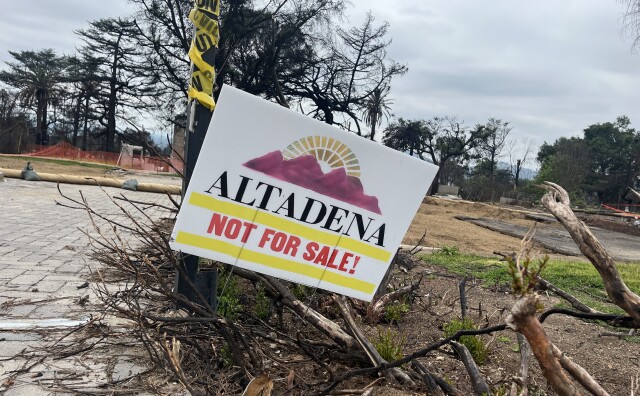Congress has cut federal funding for public media — a $3.4 million loss for LAist. We count on readers like you to protect our nonprofit newsroom. Become a monthly member and sustain local journalism.
After Atlanta Mass Shooting, Reports Of Anti-Asian Incidents Soared

More than 2,800 anti-Asian incidents— the largest share coming out of California — have been reported to Stop AAPI Hate since six women of Asian descent in the Atlanta area were killed in a mass shooting in March.
That brings the total number of hate incidents nationwide recorded by the group since its founding in March 2020 to 6,603.
L.A.-based co-founder Manju Kulkarni said that incidents continue unabated and that part of the surge in reporting can be attributed to growing awareness about Stop AAPI Hate. The group’s work has been frequently referenced in stories about the Atlanta shooting and anti-Asian attacks.
Kulkarni said a survey conducted earlier this year by Stop AAPI Hate also indicated that more people could be filing reports out of a feeling of responsibility that may have been compounded by the Atlanta attack. Some of the reports made in recent weeks were done so retroactively about incidents from last year.
“Many individuals expressed their desire for reporting came from, really, a sense of civic duty so that policymakers could understand what's happening in our country and take appropriate action,” Kulkarni said.
But the group warns that even the large spike in reports likely represent only a fraction of the incidents that have taken place, noting that a recent Pew Research Center study found that 45% of the Asian American adults surveyed experienced at least one incident since the pandemic began.
The new total of 6,603 is a 74% increase from the number of self-reports recorded by Stop AAPI Hate in its last report, which was issued March 16 — coincidentally, the same day as the Atlanta shooting.
Kulkarni, who leads the Asian Pacific Policy and Planning Council in L.A., said that about 40% of the recorded accounts took place in California.
Riverside was the site of one incident referenced in the report:
I was at the park with a friend and our young children. A large man was jogging by, lunged off the path toward me and yelled “F****** ch***!” in my face before jogging away. We were with our children and too scared to confront him, but he appeared unashamed as he jogged by again.
While Southern California has seen multiple violent attacks on Asians, the frequency has not been as high as in other metropolitan areas with large Asian populations, such as the Bay Area or New York.
Kulkarni said that the reasons why are not exactly clear, but one factor may be that Southern California’s large Asian American communities are spread across a sprawling region, rather than concentrated in a smaller geographic area that may have made victims easier targets.
The vast majority of reports to Stop AAPI Hate do not involve violence. Verbal harassment accounts for more than two-thirds of incidents, followed by shunning at 18%.
Kulkarni said it’s critical to track all sorts of incidents, not just those with an “underlying criminal element,” which represent less than 10% of what Stop AAPI Hate has recorded.
“Law enforcement is not going to be the only solution here,” Kulkarni said. “We need strong civil rights laws to address that 90% of what's happening in terms of verbal harassment, workplace discrimination, and discrimination at restaurants, grocery stores, pharmacies.”
As Editor-in-Chief of our newsroom, I’m extremely proud of the work our top-notch journalists are doing here at LAist. We’re doing more hard-hitting watchdog journalism than ever before — powerful reporting on the economy, elections, climate and the homelessness crisis that is making a difference in your lives. At the same time, it’s never been more difficult to maintain a paywall-free, independent news source that informs, inspires, and engages everyone.
Simply put, we cannot do this essential work without your help. Federal funding for public media has been clawed back by Congress and that means LAist has lost $3.4 million in federal funding over the next two years. So we’re asking for your help. LAist has been there for you and we’re asking you to be here for us.
We rely on donations from readers like you to stay independent, which keeps our nonprofit newsroom strong and accountable to you.
No matter where you stand on the political spectrum, press freedom is at the core of keeping our nation free and fair. And as the landscape of free press changes, LAist will remain a voice you know and trust, but the amount of reader support we receive will help determine how strong of a newsroom we are going forward to cover the important news from our community.
Please take action today to support your trusted source for local news with a donation that makes sense for your budget.
Thank you for your generous support and believing in independent news.

-
Experts say students shouldn't readily forgo federal aid. But a California-only program may be a good alternative in some cases.
-
The program is for customers in communities that may not be able to afford turf removal or water-saving upgrades.
-
More than half of sales through September have been to corporate developers. Grassroots community efforts continue to work to combat the trend.
-
The bill would increase penalties for metal recyclers who possess or purchase metal used in public infrastructure.
-
The new ordinance applies to certain grocers operating in the city and has led to some self-checkout lanes to shutter.
-
Children asked to waive right to see a judge in exchange for $2,500







